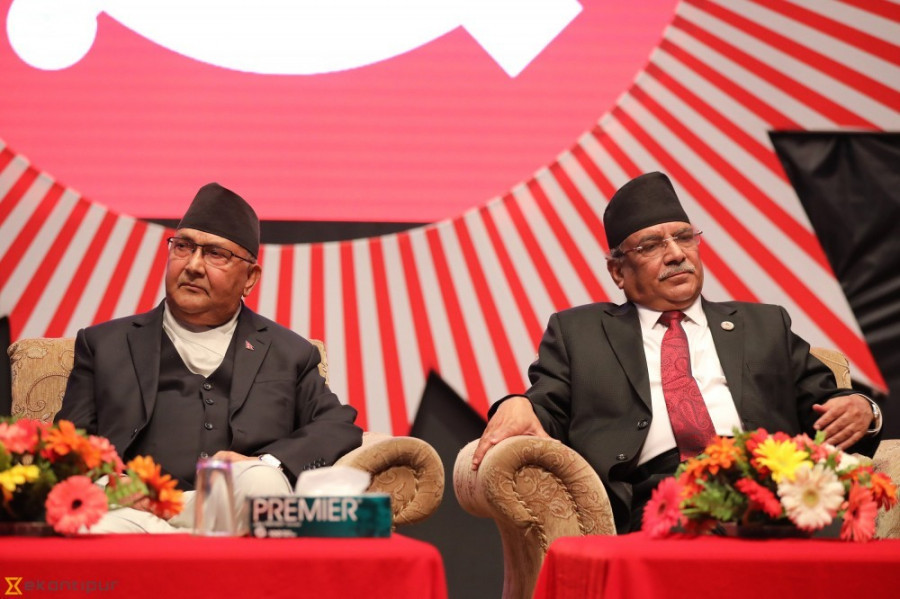National
Swearing by political principles and acting just the opposite
Nepali politicians are losing their moral compass, they themselves say to criticise others. Analysts say a lack of political morality among leaders is a threat to democracy.
Tika R Pradhan
Nepali politicians are never tired of swearing by democratic virtues, but never before have they exasperated the people like they have done today. And one intriguing feature that is common among most of the Nepali leaders today is—they are branding others as wicked and evil, accusing each other of losing their moral compass.
On Monday, CPN-UML chair and Prime Minister KP Sharma Oli said what the Madhav Kumar Nepal faction did in Karnali was an immoral act.
Four of the UML leaders belonging to the Nepal faction on Friday defied the party whip to vote in favour of Mahendra Bahadur Shahi to save his chief ministerial post. UML Standing Committee member Pradeep Gyawali, who is also the foreign minister and Oli’s close confidant, said what the Nepal faction leaders did in Karnali was against the parliamentary system.
In what came as a surprise to many, the Nepal faction leaders, who had defied the party whip, on Saturday were appointed ministers in the Shahi government in Karnali.
Both Oli and Gyawali would have been right had they not been involved in shenanigans of a similar sort of their own, analysts say. Oli himself has been re-appointing those ministers who have been ousted by the Communist Party of Nepal (Maoist Centre). One third of Oli’s Cabinet ministers are not members of the federal parliament, as they were suspended by the Maoist Centre for defying the party orders.
After the infighting in the Nepal Communist Party (NCP) reached a breaking point, Oli on July 2 last year suddenly prorogued the House session. He feared a no-confidence motion was coming. Five months later, around seven dozen lawmakers belonging to the Pushpa Kamal Dahal-Madhav Nepal faction prepared a no-confidence motion. Oli on December 20 dissolved the House, hours before they registered the motion at the Parliament Secretariat. The Dahal-Nepal faction, the Nepali Congress and the Janata Samajbadi Party took to the streets, objecting to Oli’s dissolution move. It was restored by the Supreme Court on February 23.
Two weeks later, on March 7, the Supreme Court scrapped the Nepal Communist Party (NCP) and revived the UML and the Maoist Centre. In effect, it broke the Dahal-Nepal alliance.
The Janata Samajbadi Party, which vehemently opposed the House dissolution and saw Oli as the biggest obstacle to its cause including constitutional amendments, now is in negotiations to seal a deal.
On Monday, five Janata Samajbadi members of the Lumbini Provincial Assembly signed a no-confidence motion, prepared at the leadership of the Maoist Centre and Nepali Congress, against Chief Minister Shankar Pokharel, one of Oli’s close allies.
But hours later, four Janata Samajbadi leaders took the oath as ministers—three of them had signed the motion and one had not.
Last week, 28 members of the Nepali Congress, the Maoist Centre and the Janata Samajbadi Party in the Gandaki Provincial Assembly filed a no-confidence motion against Chief Minister Prithvi Subba Gurung, another confidant of Oli.
Gurung followed in his master Oli’s footsteps. As he had sensed a confidence motion against him, he prorogued the Provincial Assembly on Wednesday, the notice regarding which was made public on Thursday afternoon, hours before the motion was filed.
Analysts say there is no doubt that Nepali politicians are failing to maintain the minimum political morality and propriety and that they have rather engaged in blame games. In Nepal’s politics, it’s like the pot calling the kettle black, analysts say.
“There seems to be an utter lack of democratised minds in Nepali polity,” says Uddhab Pyakurel, a commentator on current affairs who teaches political sociology at Kathmandu University. “I don’t think the kind of ugly political games we are seeing here would be seen anywhere in the world.”
Ever since Oli dissolved the House, the conversation has turned ugly in Nepali politics. Leaders have not only limited themselves just to scathing and acerbic remarks against each other but also have engaged in passing some serious allegations.
“Nepali politicians’ behaviour and actions have emerged as a major threat to democracy,” said Bhojraj Pokhrel, a former chief election commissioner. “What is worrying is there is a danger that members of the public could start developing a distaste for the system if the politicians continue to act like this.”
According to Pokhrel, Nepali politicians do not give two hoots about ethical politics and their focus is on power.
“We can just feel ashamed of our politicians and their activities,” he said. “To attain power, our politicians these days appear to be ready to go to any extent.”
There is a general understanding among many that Oli should have stepped down the moment his House dissolution move was overturned. But it was incumbent upon the Maoist Centre also to withdraw its support after the March 7 court decision revived it and the UML.
After the House was revived, the Maoist Centre made attempts to unseat governments in Province 1 and Bagmati. However, no-confidence motions were delayed by the respective governments and assembly speakers.
The motions were withdrawn later on April 5 in Province 1 and on April 7 in Bagmati, as the UML controlled the majority after the court’s March 7 decision revived the party.
Shreekrishna Aniruddh Gautam, a political commentator who regularly writes on contemporary politics for the Post’s sister paper Kantipur, said the unprincipled politics that started from Kathmandu now has reached provinces.
“Oli set in motion a bizarre chain of events by dissolving the House, which was out and out an unconstitutional and unprincipled move,” Gautam told the Post. “Now provinces which are led by his disciples are following him. Other parties have started to think if Oli can make unethical decisions, why not them?”




 11.12°C Kathmandu
11.12°C Kathmandu














